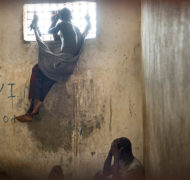God Never Promised Life Would Go Smoothly - Joseph’s Dashed Hopes (Sermon Notes)
Sermon Notes / Produced by Individual TOW Project member
Some Christians seem to believe that if you do right by God then all will go well for you. It's a very attractive theology until you hit real life and find that Christians still have to face suffering and disappointments and failure and death just like everyone else. Where does that sort of theology come from? Certainly not from the story of Moses or David or Ruth and Naomi or Job. Nor from the Psalms where we often hear the lament "How come bad people have it so good while good people have it so bad?" Nor from the gospels where we find even Jesus himself sweating blood and praying please take this cup of suffering away from me. Nor from the Apostle Paul who is very focussed on standing up for God yet keeps on getting put in prison and ends up spending a good portion of his life there.
Jesus never promised that if we get on board with him everything will go well for us. In fact when his disciples did literally get on board with him to sail across the sea of Galilee he led them straight into such a storm that even they as sailors were terrified. That was because they did exactly what he asked them to. The promise was never that we would no longer face any storms, just that he will always be there with us in the heavy weather.
It's just as well that Joseph didn’t subscribe to this sort of triumphalistic theology. It’s a formula for disillusionment and disaster when things do go wrong, and they did go pretty wrong for Joseph. Firstly as he was dropped into a pit by his angry brothers and then sold into slavery. And then having survived that, when later he does just the right thing in resisting the persistent attempts of Potiphars wife to seduce him, he is thrown into prison on the basis of her false accusations. And he's left there, not just for a weekend or even a month or 3 months but for years, because Genesis 41:1 makes plain that he spent at least 2 years in jail after interpreting the dreams of the cupbearer and baker before interpreting Pharoah’s dream. The story also makes plain that quite a long time in prison must have elapsed before Joseph interpreted those first two dreams because he had already gained the confidence of the chief jailer and been put in charge of all the prisoners. That wouldn’t have happened quickly. From verse Genesis 41:46 we know that Joseph was thirty years old when he is released from jail and starts working for pharaoh. Putting all that together with the information from Genesis 36 that tells Joseph was about seventeen when he was taken to Egypt we know that the story of his work with Potiphar and his life in prison covers about 13 years. We can’t say exactly how much time was spent in each place, but it was a number of years.
So the last part of Genesis 39 and Genesis 40 mark a huge reversal in the fortunes of Joseph, just when it looked as if things were starting to turn out all right after being threatened with death and sold into slavery and dragged off to Egypt. In the first sermon of this series we saw Joseph gifted with some dreams from God that seemed to promise a future filled with significance and success. Then suddenly all his dreams dashed. Then with the support of Potiphar there grows a sense that maybe there was something in those dreams after all. It’s just that God was working them out in an unexpected way. Then suddenly here we have hopes dashed again, and even more mystifying because this time it's actually because he takes a stand for God that it happens.
How do we respond when our dreams turn to custard, when everything goes wrong just when we thought it was going to turn out all right? Where is God in the midst of dreams deferred and disappointment like this?
Walter Brueggemann in his commentary on Genesis says that there are two recurring themes through these chapters that aren’t easily reconciled. The first one says that life is lived at great risk. We can never be sure what will happen especially in the face of so much hatred and deceit and temptation and seduction, especially where we live like pawns in a game that is controlled by other players who often don’t have our best interests at heart. So because to some extent all of us live at the mercy of circumstances beyond our control, life is lived at great risk. At the same time says Brueggeman there is also another theme that life is confidently settled. God clearly has everything under control so don’t worry. From Brueggemann’s point of view, Joseph's story is a vivid reminder of both of these perspectives. It’s the story what real faith looks like in the midst of real life.
The temptation is that we only emphasise one theme at the expense of the other. One solution is just to come up with some very reassuring spiritual formulas that say: all is well and will always remain so for good Christian people. This is essentially to deny that there is any real struggle for Christians to come to terms with here. While the other solution is to just accept fatalistically that bad stuff happens to all of us and that’s that. Just accept it and get on and do the best you can. I think that most of us see that a biblical world view isn’t content with either of these solutions on its own. The first is too triumphalistic while the second is too paralysingly pessimistic.
The story of Joseph says that both things are true: That God is in control, but bad stuff does happen. Even to those who go out on a limb for God, and maybe even especially to them.
So how do we respond when our lives turn to custard? When we do what God requires but things still don’t turn out all right? When having nurtured what we have felt sure are God-given dreams we find our dreams deferred? And not only waiting but maybe even in a worse position than we were before?
Ben Jonson once wrote that no one knows their own strength until they have met adversity. We are only really tested when we face obstacles in life and are forced to tackle them head on. This is how character is built: when we lose what we thought was a secure job, or when we have our hearts broken in love, or when we find ourselves betrayed, or when we face the death of a close relative or friend, or when we suddenly find ourselves forced to revise our dreams through some illness or disability. I know that many of us here have found ourselves caught up in crises just like these and for some of us this is the story of our lives right now. None of these are resolved in a moment. Most take a long time. Some may seem never to be resolved in this life.
As Jacob’s favourite and sheltered son, Joseph seems pretty ill-prepared for this. Certainly he has been through at least two giant reversals before and lived to tell the tale: the death of his mother and betrayal by his brothers. Sometimes that mokes it easier - knowing that you have been able to summon up more resources before than you thought you had. But sometimes that also makes it more difficult, reliving all those anxieties and fears, and feeling that you are being sucked back into a time and place that you hoped that you had left behind for good. There’s a verse in Proverbs 13:12 that says "hope deferred makes the heart sick." What do we really need to keep us going at times like this, when living at risk seems so much more real than the reassurance that God is in control? What kept Joseph’s hope alive? What has helped to keep your hope alive at times like this? Let’s stop and talk about this for awhile. What have you found helpful to keep your hope and faith alive when life has turned to custard for you? (Discussion)
There is a poem written by a soldier in the American Civil War that says this:
I asked for riches that I might be happy
I was given poverty that I might be wiseI asked for power that I might have the praise of men
I was given weakness that I might feel the need of GodI asked for all things that I might enjoy life
I was given life that I might enjoy all thingsI am among men most richly blessed
This sounds a bit like what the apostle Paul said, and he probably spent even longer in jail than Joseph. So strange then that he can write in his letter to the Christians at Philippi about the need to keep rejoicing in the Lord in all circumstances, a refrain that he repeats 16 times in just 4 chapters. Not that he doesn’t also write about some very alarming challenges and dangerous circumstances. He knows that real life is a risky business. Yet at the same time he also knows that ultimately the end of the story is in safe hands and is not uncertain.
Is this what it takes to enable a Nelson Mandela or Alexander Solzenhitsyn to emerge from decades of unjust captivity still with enough strength and courage to lead? I find it fascinating to read the reflections of concentration camp inmates about this. The psychologist Bruno Bettleheim spent 12 months in Dachau and Buchenwald and says that he observed that it was the prisoners with strong identities who survived - whether these had been shaped by their religious or political convictions. Such people maintained a larger and more comprehensive vision of who they were and why they needed to survive and so remained much more resilient in the face of persecution.
Victor Frankl, also a survivor of the death camps, says in his book Man’s Search for Meaning that its not the particular circumstances that determine survival so much as how much people are thrown by no longer being in control and if they can retain a sense of self that is not undermined from outside. He says it is the people who lost their inner hold on their moral and spiritual selves who eventually fell victim to the degenerating influences in the camps. The question is how do you retain that inner hold?
Joseph Campbell talks about the difference between celebrities and heroes. The celebrity he says lives for themselves while the hero lives to redeem others and society. Surely this is a major key to Joseph's durability. He is not just an ambitious person. He sees himself as a player in a much bigger historical and spiritual movement, amovement bigger than himself and also much bigger than those who hold him captive. He knows that he must remain accountable to that vision but also that even those who abuse him now will also be held ultimately accountable too.
Certainly there are times when it seems as if we have been reduced to just surviving, and that even this bare minimum is demanding everything that we have got. But it will pass, so long as we believe that what we do does matter and some greater purpose is being worked out here despair needn’t overwhelm us. In the face of such adversity we will need to find ways to nurture that faith and hope in us. Joseph must have found ways, and we can too: through remembering God’s faithfulness in the past, through leaning on the encouragement of friends and on the prayers of others when we can’t pray for ourselves, and joining in the laments in scripture that encourage us to give vent to our anguish and to hold on to the promises there too, even when they might feel absurd in our circumstances. And keeping contact with those among God’s people who are trying to understand so that we aren’t just left to struggle in solitary. Doing other things that Jesus tells us to like celebrating communion: Do this to remember me - this is my body for you
I think of some words that I read this week where the writer said Grunewalds painting of the crucifixion hangs in my study. It is a grim painting, with agony in every line. No romance here. Broken bread and wine poured out are symbols of sacrifice. I look back at this whenever I come to the Lord’s table. I treasure the memory. It belongs to the historical bedrock of my faith, for it is the reminder that even in the most extreme circumstances Christ is present for our comfort in sorrow, our strengthening in weakness, our forgiveness in guilt, and our reassurance in despair. These are not just empty words uttered from on high, for this one has come in person to strengthen our resolve so that we can live and love as partners with him.
Only further down the track will Joseph be able to see what is really happening here, how it might all unfold. We have the benefit of hindsight to be able to read ahead and know the end of this story. For Joseph, the real key was learning to trust God just one step at a time no matter what the circumstances, so that he could feel grounded in certainty even in the midst of great risk. Isn’t that what we all need? Isn’t this just what the God of Joseph and of Jesus also offers us?













